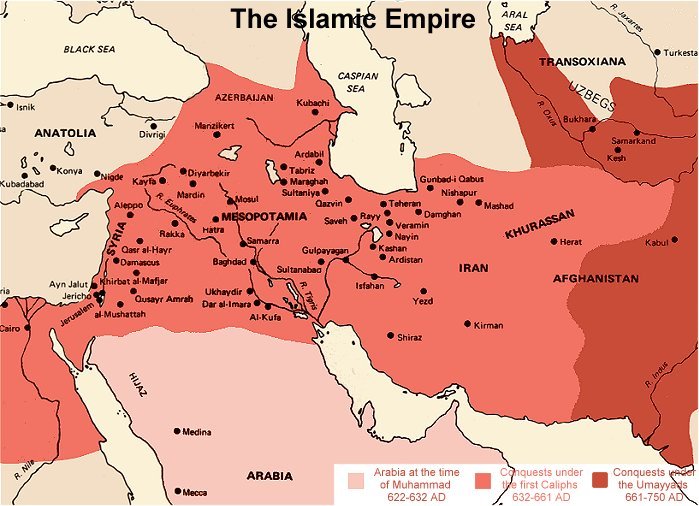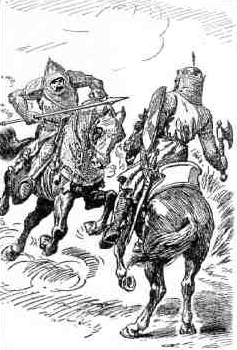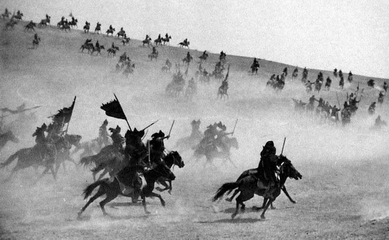One of the strangest, but not unexpected, battles of words and
ideologies is over the claims made about the Muslim perception of
Jihad and Jihadism and their impact on public speech. Although
there are various clashes on this level, it is appropriate here to
introduce the essence of this ideological confrontation.
In the three Wars of Ideas from 1945 to 2006, the heart of the
Western engagement in the conflict was the understanding of two
issues: what Jihad was historically and what Jihadism is in modern
times. These are two different but related phenomena.
Jihad, like a number of other historical developments throughout
the world, was a religiously-based geopolitical and military
campaign that affected large parts of the world for many
centuries. It involved initial theological teachings and
injunctions, followed by 14 centuries of interpretations by
adherents, caliphs, sultans and their armies, courts, and
thinkers. The historical reality of Jihad has been intertwined
with the evolution of the Islamic state since the seventh century.
It is emphatically not
a modern, recent, and narrow creation by a small militant faction.
It has to be
seen in its historical context.

But on the other hand, this giant doctrine, which motivated armies
and feelings for centuries, also inspired contemporary movements
that shaped their ideology based on their
interpretation of the
historical Jihad. In other words, today's Jihadists are an
ideological movement with several organizations and regimes who
claim that they define the sole interpretation of what Jihad was
in history and that they are the ones to resume it and apply it in
the present and future. It is equivalent to the possibility that
some Christians today might claim that they were reviving the
Crusades in the present. This would be only a "claim" of course,
because the majority of Christians, either convinced believers or
those with a sociological Christian bent, have gone beyond the
Christianity of the time of the Crusades.
 Today's
Jihadists make the assertion that there is a direct, generic, and
organic relation between the Jihads in which they and their
ancestors have engaged from the seventh century to the
twenty-first. But historical Jihad is one thing, and the Jihad of
today's Salafists and Khumeinists is something else.
Today's
Jihadists make the assertion that there is a direct, generic, and
organic relation between the Jihads in which they and their
ancestors have engaged from the seventh century to the
twenty-first. But historical Jihad is one thing, and the Jihad of
today's Salafists and Khumeinists is something else.
As with all historical events, literary, analytical, and
documentary efforts to interpret and represent past episodes
frequently influence the psychology, imagination, and passions of
modern-day humanity. Textbooks across the world detail battles,
discoveries, and speeches that are the benchmarks of the formation
of the national or
civilizational identities of peoples.
But even if the events in some nations' eyes are proud episodes,
they are often considered disasters by other nations. The Native
Americans obviously do not celebrate the Spanish conquests; the
British Empire
is a matter of pride to the English but not to the colonized
peoples; and Napoleon's "liberations" are not fondly remembered by
those who were conquered.
And this is the perception of Jihad among classroom pupils in the
Arab and Muslim world: it is a matter of historical pride. For
example, in the books from which I was tested for my history
classes, a famous general of the Arab Muslim conquest, Khalid Ibn
al Walid, is treated as a hero because he conquered
Syria,
Palestine,
and
Lebanon's
shores. But to Aramaics, Syrians, and Jews, he was a conqueror. He
was what Cortez was to the Mexican Indians – an invader.


In the same textbooks, Tariq bin Ziad, the general who led the
Muslim armies into
Spain,
is presented as the hero of heroes; but in the eyes of the
Iberians, he was
a conqueror, and in the modern lexicon, he would be described as a
colonial occupier.
So, historical
perception
is really in the eyes of the beholder.
This is about Western guilt here.
While the
latter culture has largely demythologized its own conquerors and
ideologies, once described as heroic – Napoleon, Gordon of
Khartoum, "Manifest Destiny," etc – it has accepted docilely ideas
like the "spread of Islam," the benevolence of Arab occupation,
etc. Westerners are schooled to repudiate the errors of the past
in their own culture, but to overlook those of other cultures
today. This is where the Jihadi propaganda campaign deliberately
harps on "Muslim resentment of the Crusades," in order to play
upon this "guilt complex."
Historical Jihad doesn't escape this harsh rule of history. Those
who felt their ancestors' deeds were right – including military
invasions and their violent consequences – see Jihad as a good
thing. And those who felt their ancestors were conquered and
victimized see it as a disaster. This is the drama of the invading
Arabs on the one hand and the conquered Persians, Assyro-Chaldeans,
Arameans, Copts, Nubians, and Berbers on the other; of conquering
Ottomans and conquered Armenians, Greeks, and Slavs.
It should be noted that many of the conquered had been conquerors
earlier, such as the Greeks, Persians, Assyrians, and Egyptians.
World history is made up of such reversals. But the emotional
perception of the past should stop at contemporary reality.
Feelings and passions about the tragedies of the past cannot be
erased and should not be forgotten, but they have to give way in
the end to international law and doctrines of human rights.
Many Christians today may believe that the Crusades were warranted
at the time, but that cannot become a basis for military action
under today's international consensus. The religious legitimacy of
the Crusades or the Spanish Conquista no longer exists. Even the
theological ground upon which many European Christians settled
North America,
although studied as an historical phenomenon, is irrelevant after
the Constitution. And despite the fact that many Jews invoke
religious Zionism as a basis for the re-creation of modern-day
Israel,
and that this is a deep conviction of many evangelical Christians,
international law doesn't allow it as a component for the
recognition of the state of
Israel.
In essence, twenty-first-century world society does not and cannot
function as an extension of past centuries' theologies and
philosophies. There is a full freedom of religion and thought for
individuals and communities to believe in their faith's tenets
regarding questions of land, nations, war, and peace. But these
beliefs have standing under international law only insofar as they
correspond to, and fall within, the world consensus on peace and
coexistence.
From this perspective, the question of contemporary Muslims and
Jihad cannot be an exception. Today's Muslim individuals and
communities may have their feelings, passions, and readings of
past historical Jihads. Some may attach a religious value to them.
But even if in the past jihad was a tool of the state and
considered a legitimate form of warfare led by the caliphs (in the
same way the Crusades and biblical wars were legitimate in the
eyes of their peoples), under international law today there are no
legitimate Jihads. The theological authority of Charlemagne and
Caliph Haroun Al Rashid, and of Louis XIV and Suleiman the
Magnificent may have been mainstream during their times, but not
anymore. Hence neither French president Nicholas Sarkozy nor
Iranian president Ahmedinijad can invoke religion in his defense
or when discussing international policies.
Thus the Muslims' relationship with this old and historical Jihad
is in the domain of past events and emotions; however, it can be
reinterpreted to fit the form of modern society in such a way that
it does not violate international law. Jihad as a personal
"spiritual" dimension can exist, but only as different, separate,
and distant from the historical Jihad.
The new proposition advanced by scholars in the West that a
nonviolent, inner, and personal Jihad is the "real one" can be
tested only in the wake of a cultural, widely accepted principle
that the historical, theologically endorsed Jihad warfare is over,
and not just suspended or hidden. Short of this fundamental reform
in Jihad perception, similar to the modern repudiation of the
Crusades and biblical wars by Christians and Jews, any current
political affiliation with the ancient Jihad would be in
contradiction with contemporary international law. Hence the
argument that the Muslims have "sensitivities" regarding the issue
of historical Jihad, which therefore cannot be criticized or
maligned, is at odds with the current structure of international
relations and laws.
As long as a world consensus exists on the nonreligious nature of
international relations, the political and legal dimensions of the
historical Jihad cannot be played out in the international or
public policy affairs of modern society.
One cannot argue, for example, that jihad is the equivalent of
self-defense in the modern international system. Self-defense
doesn't relate to any theological concept. But if self-defense in
Islamic religious law covers oral insults to Islamic values, then
Muslim governments or a future caliph could declare wars of "self-defense"
based on mere statements made by individuals and groups (thus, the
Danish cartoons would have justified Jihad against Denmark in the
name of "self-defense").
Similarly, if to some Christian sects self-defense could be linked
to an "end-time" theology, or if future religious groups through
self-defense could be a response to a divine order to reshape
humanity by force, these interpretations could lead to a collapse
of the planetary order.
In sum, the basis of twenty-first-century peace is to abandon the
racial, religious, and cultural legitimization of wars.
International society, with its various nations and cultures,
including the Muslim ones, has agreed on this since 1945, at least
in principle.
Dr
Walid Phares is a senior fellow with the Foundation for the
Defense of Democracies, a professor of comparative politics and
the author of
The War of Ideas